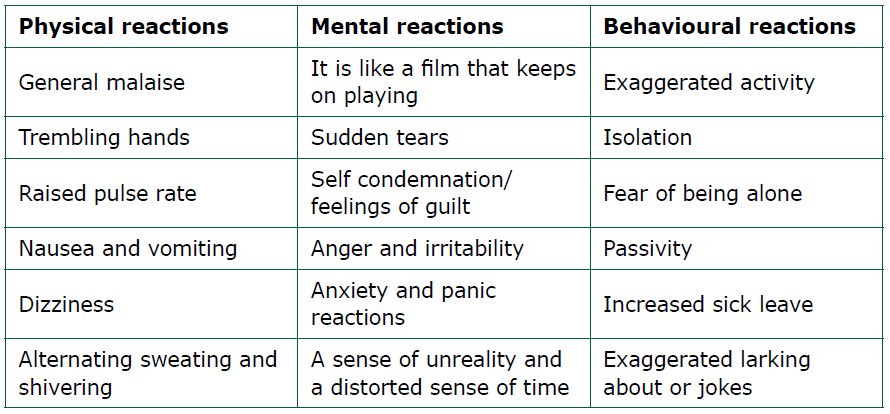CRISIS MANAGEMENT
Worth knowing about crises
Precisely when people react to a crisis varies. Reactions normally disappear after 1-2 weeks but if you subsequently experience something that reminds you of the unpleasant event, it may well take slightly longer before reactions totally disappear. It is impossible to know in advance what events or episodes get us to react and sometimes reactions may also be an expression of "the final straw". Some of the events that generally cause us to react are listed below:
What typically causes a crisis reaction?
Some of the events that can typically make us react are listed below.
People's lives are threatened
People feel threatened or harassed
People are unprepared for what is happening
The situation is perceived as unmanageable:
- Because it is overwhelming
- Because they have no experience draw on
- Because they have no control over the situationTheir normal ways of dealing with challenges are inadequate.
They may also get strong feelings of helplessness and vulnerability.
Standard crisis reactions
A range of typical crisis signals may appear after a crisis event. Be aware of these if you recognize them in yourself or in other people.
What can be done?
What can those affected by a crisis do for themselves?
Be aware of their own reactions and compare them to typical crisis reactions.
Tell workmates about the event.
Tell family and friends.
Avoid isolation.
Try to maintain normal daily routines.
Do not delay going back to work again too long – it is helpful to be with workmates who know your working environment.
But do not start again too early either – give yourself to time to get back on top again.
How can you help a colleague after a difficult or violent situation?
When talking to a colleague after a difficult event, you can help best by:
Finding somewhere you can sit undisturbed.
Being close (physically and mentally).
Listening actively.
Talking openly and directly about the event.
Finding out what your colleague needs.
Avoiding humour and telling funny stories.
Not playing things down. Never say "forget it".
Not giving good advice.
Trying to control the conversation and talking of your own experience.
When to seek professional help
Crisis reactions are a natural part of our lives and are quite simply the result of the body and mind reacting. If you are threatened, it is perfectly normal to be nervous about going back to work. It is a kind of protection mechanism.
If you have been subjected to a difficult event, you should seek professional help if:
You have not slept for several days.
Your speech is disconnected and not understandable.
You see yourself or those around you as unreal.
You do not recognize yourself.
Those close to you say they cannot recognize you.
You keep getting flashbacks of the event or parts of it as if it were a film.
Crisis reactions are catching – role of the manager
If a member of the crew suffers a crisis, it is important that you as manager know what you should be aware of and what initiatives should be taken.
As a manager, you should ensure that:
The whole group should be considered. Speak to the whole group and keep them informed.
The whole group may be affected and suffer reactions.
Relations may suffer in the wake of the crisis.
Contact should be maintained with a colleague suffering from a crisis when he/she is on sick leave.
Special consideration should be shown to those affected by a crisis when they return to work.
Employee appraisals should be held as part of post-event treatment.
A report should be made to the Danish Maritime Authority if the event leads to sick leave.
The safety committee aboard is briefed.
Organise activities to prevent and reduce crisis reactions
Experience has shown that crisis reactions and any health impacts can be minimized or completely removed if the company has a good crisis management service and managerial backing when the service is needed. A crisis service should at the very least include:
Guidelines for mental first aid from colleagues, for example by way of training from crisis service personnel.
A procedure for safe, fast and easy access to professional counselling.
Guidelines for support and backing from management associated with, and in the time after, a violent event.
Knowing what requires a crisis event report.

